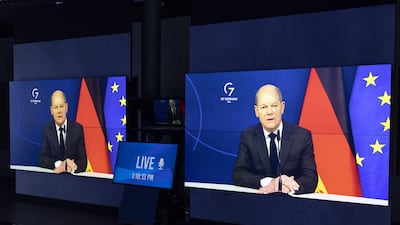German Chancellor Olaf Scholz said the country would use its leadership of the G7 in 2022 to fight against divisive forces that seek to exploit issues like climate change and the pandemic to hamper international co-operation.
Addressing the virtual World Economic Forum event as the first new German leader in 17 years, Mr Scholz depicted German as a bulwark for sustained and united international action.
“Some will try to tell us that dialogue and compromise are signs of weakness,” he said. “Some will try to pitch climate action against prosperity. Some will try to argue that social progress hampers economic growth and some will try to divide us into cosmopolitans and regular citizens, the anywheres versus somewheres, rich and poor. But the truth is the progress we want will only be possible if we overcome these divisions. Working together is the way, restoring trust is our goal.”
One of the themes was to highlight Germany’s efforts to foster talks with Russia as diplomats seek to ease tension over the build-up of Moscow's forces around Ukraine.
Working to address Russian concerns, Mr Scholz, who leads a three-party coalition, also said the country and the West as a whole was united over Ukraine. Germany was committed to protecting Ukraine’s territorial integrity and he urged Russia to recognise that “right makes might” and not the other way round.
“After years of rising tensions, staying silent is not a sensible option,” he said. “Borders must not be moved by force
“The Russian side is aware of our determination. I hope they also realise that the gains of co-operation outweigh the price of further confrontation.”
Fears are mounting that Russia’s aggression toward Ukraine could escalate into full-scale armed conflict despite intensive efforts in recent weeks to broker a peaceful solution.
President Vladimir Putin has denied he plans to invade Ukraine, despite massing more than 100,000 troops along Russia’s frontier with its neighbour. He has demanded security guarantees from Nato that the military alliance has said it cannot give.
Germany's role as president of the G7 puts the country at the forefront of global efforts to get the Covid-19 pandemic under control. Mr Scholz pointed to the inequality of the worldwide vaccines campaign, with the richest countries boasting far higher rates of coverage than the poorest.
“Without a truly global immunisation campaign, we will soon run out of the letters of the Greek alphabet to name new virus variants,” he said.
“We are determined to reach 70 per cent of the world's population by the middle of the year,” he said. “And as part of our current G7 presidency, we will focus on improving the international health infrastructure including in countries of the Global South.”
The German leader appealed to the business leaders that follow the WEF and normally gather at its HQ in the Swiss resort of Davos for the January meeting.
“We need partners to join hands, particularly in the private sector. So in the spirit of Davos, let us work together to fully fund the global vaccination campaign,” he said. “That would also be the booster shot our economies need.”
Germany plans to use the G7 presidency to “turn that group into the nucleus of an international climate club.”
“What we want to achieve is a paradigm shift in international climate policy. We will no longer wait for the slowest and least ambitious,” Mr Scholz said. “Instead, we will lead by example, and we will turn climate action from a cost factor into competitive advantage by agreeing on joint minimum standards.”
Several groupings of countries have similar goals, including the so-called High Ambition Coalition that’s committed to achieving the strictest target in the Paris accord — limiting global warming to 1.5 degrees Celsius by the end of the century compared with pre-industrial times.
Mr Scholz took office last month with a government that includes the environmentalist Greens. It aims to step up efforts against climate change by expanding the use of renewable energy and bringing Germany’s exit from coal-fired power forward from 2038, “ideally” to 2030.


